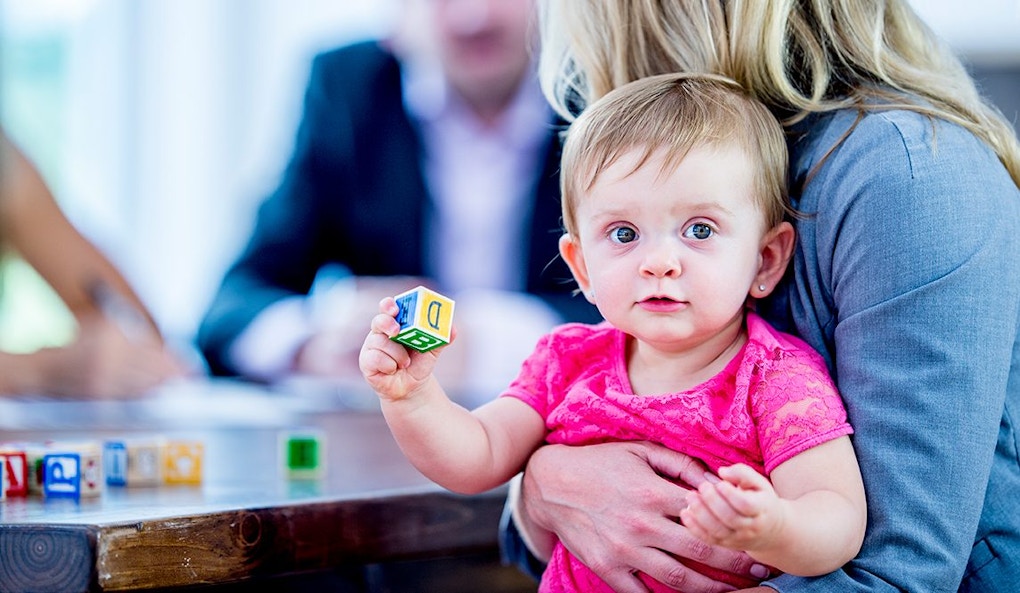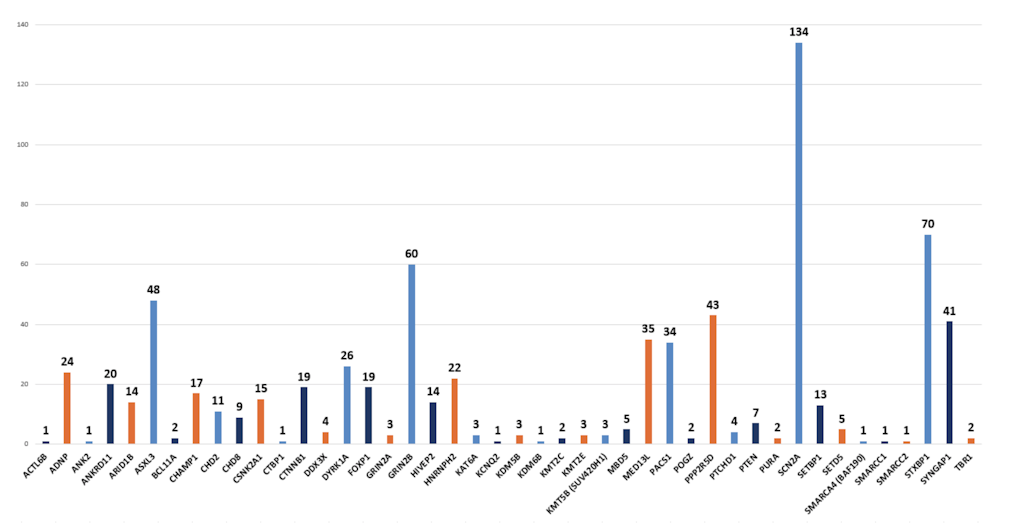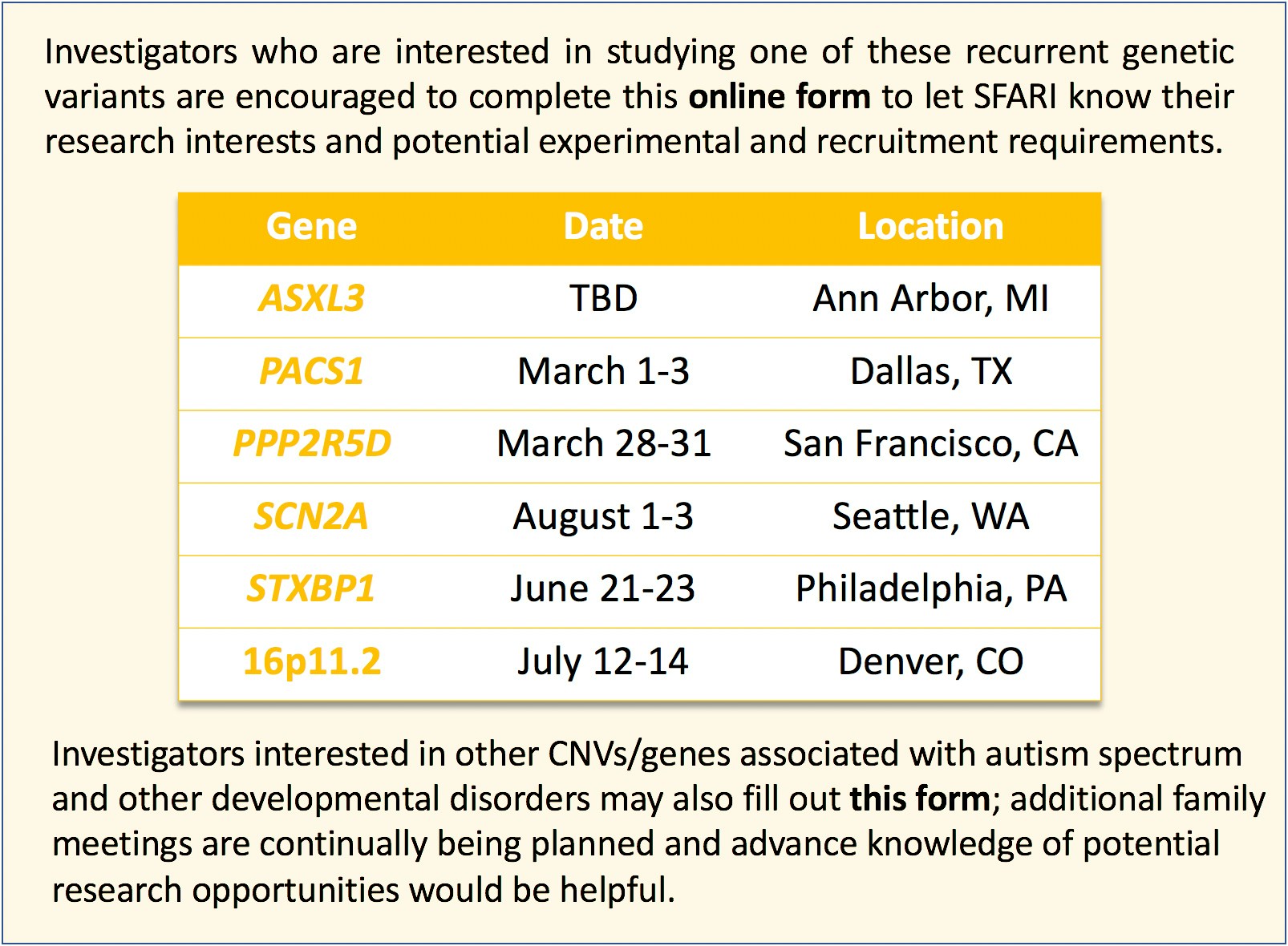
Families of children with neurodevelopmental genetic conditions periodically organize meetings and conferences to help connect with others sharing the same genetic condition. Family groups who have partnered with the Simons Variation in Individuals Project (Simons VIP) to host their registry and natural history information are planning a number of meetings in 2019, including meetings focused on individuals with 16p11.2 copy number variants (CNVs) and variants in ASXL3, PACS1, PPP2R5D, SCN2A and STXBP1 genes.
These copy number variants and genes are known to be associated with autism spectrum and other neurodevelopmental conditions that are characterized by motor and language impairments, intellectual disability and/or seizures. As each of these genetic disorders is rare, these family meetings provide a unique opportunity for researchers to connect with, and study in the same venue, a relatively large number (typically 5–40) of individuals from all over the world with the same condition (Figures 1, 2).
“Long-term goals for this ‘genetics first’ approach are to use these data to better develop targeted interventions and focused clinical care for individuals with these specific genetic events”1.

Upcoming research opportunities
While all of these meetings are organized by families (and are usually not sponsored by SFARI), SFARI staff often attend these meetings and can help to facilitate research opportunities.
Investigators who are interested in studying one of the recurrent genetic variants mentioned above are encouraged to complete this online form to let SFARI know their research interests and potential experimental and recruitment requirements. It is important to connect with the families planning the meetings well in advance, since many of these groups have already begun drafting the meeting agendas. If you are interested in just attending or speaking at the meetings, you are encouraged to fill out the form as well, and SFARI can put you in touch with meeting organizers. We also highly encourage investigators who are interested in other CNVs/ genes associated with autism spectrum and other developmental disorders to fill out this form; additional family meetings are continually being planned and advance knowledge of potential research opportunities would be very helpful.
Past meetings
Past gatherings have proven that offering opportunities for studies at family meetings is a winning formula. Families welcome the possibility to participate in research that furthers the understanding of the condition affecting their children, and researchers can recruit participants coming from all over the world who would have been otherwise difficult to identify and access.
For example, at the 2013 and 2015 family meetings on 16p11.2 CNVs, which were sponsored by the Simons Foundation, SFARI Investigator Elliot Sherr and colleagues assessed attention and visuomotor abilities in 16p11.2 deletion individuals by administering a video-game-like task on a tablet2. Sherr, in collaboration with SFARI Investigator Srikantan Nagarajan, also conducted a speech and hearing study that revealed differences in the sensorimotor processing of auditory feedback between individuals with and without 16p11.2 deletion3.
“Family meetings provide a unique opportunity to study relatively large numbers of people with these rare disorders, all at the same time and in the same location,” says Sherr. “We were able to do experiments that provided much-needed insight into not only phenotypic characteristics of 16p11.2 deletion carriers, but also fundamental aspects of speech motor control, which may partially explain the impairments in speech and language in these individuals.”

Next steps
Other studies that could potentially be conducted at family meetings include, but are not limited to, recording scalp electroencephalogram (EEG) activity and collecting biospecimens (e.g., blood, saliva or skin cells) for genetic analyses or induced pluripotent stem cell (iPSC) line generation. The data and/or samples acquired from these studies could form the basis of a scientific publication or be instrumental for generating preliminary data and hypotheses for future grant applications.
As family members typically attend the meetings as well, there will also be opportunities to gather data and/or biospecimens on unaffected relatives, including biological parents and siblings. Importantly, not only can families learn from researchers/clinicians, but past gatherings have also made it clear that researchers have an enormous amount to learn from families, who are often keen observers of behaviors that may be missed in clinical settings but which offer important clues about a genetic condition.
“I have attended many family meetings in the past and look forward to attending the upcoming ones,” says Wendy Chung, Director of Clinical Research at SFARI and the Kennedy Family Professor of Pediatrics in Medicine at Columbia University. “Families find such meetings to be valuable for connecting with others who are going through the same experiences and challenges. They also welcome interactions with researchers at such events and are eager to participate in studies that will help generate resources and knowledge that might potentially lead to better treatments and outcomes for these rare conditions.”



